Beijing will place unspecified sanctions on Lockheed Martin for its involvement in the latest U.S. arms sales to Taiwan, the second time this week that the regime announced punitive measures against individuals and entities in the United States.
The U.S. state department last week approved a request by Taiwan to update its Patriot surface-to-air missiles at an estimated cost of $620 million. U.S. defense giant Lockheed Martin is the main contractor for this deal.





